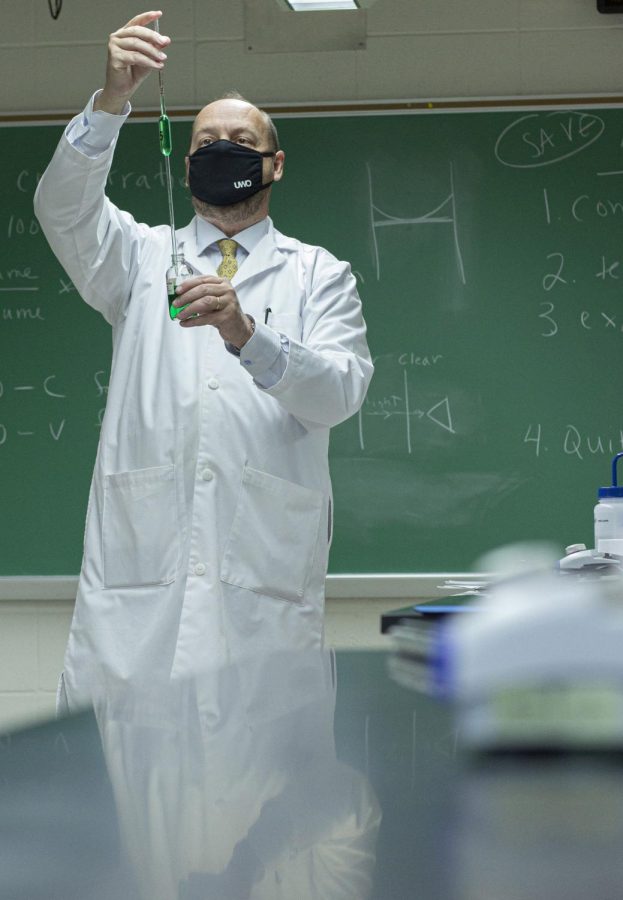UWO Chancellor Leavitt discusses leading a lab, COVID and furloughs
October 21, 2020
“I’m not a PC user, you’ll have to forgive me,” Chancellor — or rather, Dr. Andrew Leavitt told his chemistry 105 lab section Monday afternoon, as he swiveled around and pulled up a graphic of the color spectrum.
It’s not the most common sight on a college campus — an administrator leading a lecture — but the UWO campus is full of changes and oddities this semester.
Leavitt has periodically taught lab sections since the last time he led a class, lecture and all, in 2009.
Leavitt, who received a Ph.D. in chemistry from the University of Utah in 1994, taught academic chemistry at the University of West Georgia for 11 years before moving into administration. Now, he says he tries to lead a lab every few years to stay grounded to his roots in chemistry and to stay in touch with the university’s students.
Leavitt makes regular appearances at extracurricular events around campus, but he said it’s harder to keep in touch with the academic community.
“When you’re a full-time administrator, you can become very isolated, or even worse, insulated,” Leavitt said. “You don’t really truly understand what experience the students are having academically.”
“Everyone’s under a lot more stress, but I notice a lot of focus, too,” Leavitt said. “I think the students are more serious now than they had been in the past because this is a very serious time we live in. I think that people are beginning to appreciate what it means to be in a face-to-face environment and what it means to be on campus.”
Leavitt said that he was impressed with the student body’s compliance with the university’s COVID-19 precautions.
“People know that right now we’re on this tenuous plane, if you will, and we don’t know when it’s necessarily going to end and if we’ll have to go back online,” Leavitt said. “Right now, we’re looking pretty good, but you know, that could always change. It really depends on the behavior of everybody and their ability to comply with the safety guidelines.”
Leavitt said he and the university administration was aware there would be a surge in cases at the beginning of the semester, but that he’s been impressed with the student efforts to lower the cases.
“You can’t bring in this many people and not have [a surge in cases],” he said. “I’ve got to be honest, there were a couple days there I was really holding my breath, but part of what was driving the numbers was our deliberate attempt to go find the virus.”
UWO has instituted a proactive testing regimen, in which the university sought out cases in hopes to contain the spread. When someone on a resident hall floor tested positive for, Leavitt said they would call in the whole floor to be tested, instead of relying on the random testing. Now, all students living in residence halls are tested weekly, and sewage samples are analyzed for traces of COVID through UWO’s Environmental Research and Innovation Center.
Similar to his desire to connect with students in the classroom, Leavitt spent time working the front desk in Webster Hall to see the experience of students in isolation first-hand, where he said he met lots of resilient students.
But he went on to stress that housing, whether it be on-campus dorms or rental houses off campus, is where the coronavirus is spreading.
“What you do on campus, you need to do off campus,” Leavitt said of social distancing, mask-wearing and other precautions that have been implemented in the classroom. “That will help us contain the spikes that we’re inevitably going to have.”
Although he said he understands his single lab section doesn’t compare to what faculty and academic staff handle on a daily basis, Leavitt said he hopes to show solidarity with those staff by putting himself in their shoes.
“Everyone in this university has taken a big financial hit through the furloughs,” Leavitt said. “My heart hangs heavy because that’s been so disruptive to many people’s lives.”
Although most staff were furloughed either over summer or for the fall semester, the university hopes to be able to lift furloughs by the year’s end.
“I’m delighted that the enrollment turned out to be stronger than we anticipated,” Leavitt said. “I’m delighted that the state subsidy will remain largely intact this year. This means that we could lift the furloughs and let people do full work for full pay.”
Leavitt said that even though the students seem to be pulling through reasonably well, his worrying instinct of a parent comes out when students are sick, in pain or otherwise not feeling well.
“This is scary stuff,” he said.














